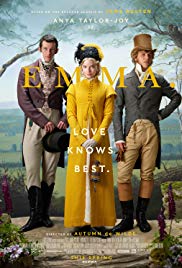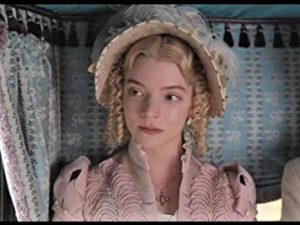Emma. *** (2020, Anya Taylor-Joy, Johnny Flynn, Mia Goth, Josh O’Connor, Callum Turner, Bill Nighy, Miranda Hart, Tanya Reynolds) – Movie Review
Director Autumn de Wilde’s period romantic comedy drama Emma. is based on the beloved classic novel by Jane Austen. The ultra-stylish novel has everything: wit, wisdom, great characters, great dialogue, great plotting, true romance, witty social satire, and a satisfying conclusion.
It is not difficult to film but it is difficult to film well. The 1996 version Emma did it already. It is a brilliant five-star version.
This time they want to make it much more lightweight, featherweight almost to the point of trivial, with plenty of lowbrow daft ‘comedy’ to make it more palatable. Obviously, this is a mistake. Austen’s comedy is highbrow, clever and always point scoring. We don’t come to Emma expecting laughs. To be fair, there are laughs here, most of them from Bill Nighy as Emma’s draught-afflicted and female-afflicted dad Mr Woodhouse, and Miranda Hart as plain, poor sad old gossipy bore Miss Bates.
Nighy and Hart are effortlessly funny people, so worth their weight in gold (and that must be considerable as both are impressively tall). But, even so, they are at their best here is the dramatic and poignant moments. They are all towards the end of the movie, so there is a bit of a long wait.
The movie starts shakily. We never really understand why Emma is obsessed with making poor pathetic Harriet Smith (Mia Goth) her constant companion and best friend, though Emma’s main recreation in life is meddling and match-making, so her main joy is trying to pair Harriet Smith with the wrong man, and her main character trait seems to be for ever getting the wrong end of the stick. Here, she is as irritating and abrasive a character as Dolly Levi in Hello Dolly! – another match-maker who doesn’t want to be caught by a man.
This makes Emma seem a manipulative muddler and a bit of an idiot, and Anya Taylor-Joy never explains why her Emma character is worth while or worthy of our interest, let alone admiration. Her treatment of Harriet Smith, Miss Bates and Mr Martin (Connor Swindells) the farmer who truly loves Harriet, is appalling and unforgivable. Yet she just takes over a gift to them and makes it all alright and they forgive her. Emma is just full to overflowing of pride and prejudice. The screenplay and Ms Taylor-Joy conspire to make her seem irredeemable.
This makes Johnny Flynn’s Mr Knightley character seem wrong headed in his quiet pursuit of her. Surely he’d be better off with some nice girl, or even with the handsome enigmatic Frank Churchill (Callum Turner), who seems to be interesting him an awful lot. OK, Jane Austen is modern but not that modern.
Nevertheless, when romance between Emma and Mr Knightley finally rears its head, Ms Taylor-Joy and Mr Flynn go to its with a credible and rare passion. Passion comes on, the film gets serious, and it goes all Jane Austen. Luckily all the good stuff is in the film’s second half, so it ends satisfyingly and you can forgive the earlier crimes and misdemeanors to Ms Austen’s masterwork.
Overall, the acting is as patchy as the film itself, with good mixing effortlessly with weak. Josh O’Connor’s ludicrous, lacivious vicar Mr Elton is hard to play, but he tries to mug and play it for brazen laughs and it doesn’t work. Tanya Reynolds is better as Mrs Elton, but she still doesn’t nail it. She’s not really funny, and the Eltons are the main comedy relief, along with Nighy and Hart.
It is Johnny Flynn’s passionate gravity that is the film’s best turn and recommendation, weirdly because it is called Emma and not Mr Knightley. Is Anya Taylor-Joy ideal as Emma? The jury is still out. Gwyneth Paltrow was perfect in 1996 and so was Jeremy Northam as Mr Knightley.
The slack pacing, silly comedy and some iffy performances are the main downsides. It goes without saying that the sets and costume designs are gloriously lovely, and the cinematography and locations too, but it is still worth saying. It is a well heeled, well handsome movie.
© Derek Winnert 2020 Movie Review
Check out more reviews on http://derekwinnert.com



